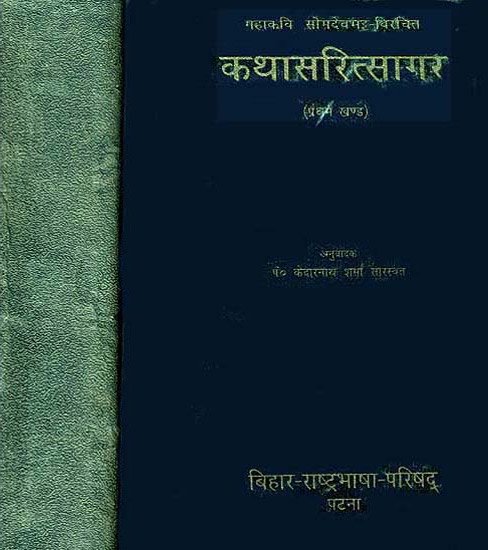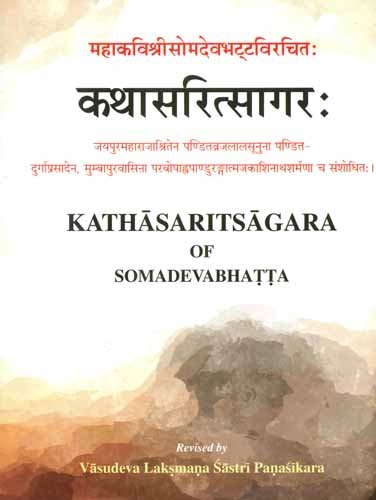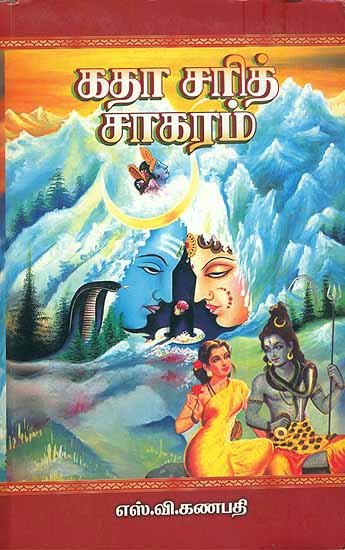Kathasaritsagara [sanskrit]
by C. H. Tawney | 2014 | 226,424 words | ISBN-13: 9789350501351
The Sanskrit edition of the Kathasaritsagara referencing the English translation and grammatical analysis. Written by Somadeva and dating from the 12th century, the Kathasaritsagara (or Katha-sarit-sagara) represents an epic legend narrating the adventures of Naravahanadatta as he strives to become the destined emperor of the Vidyadharas. Alternative titles: (Kathāsaritsāgara, कथासरित्सागर, Kathā-sarit-sāgara)
Verse 10.8.161
तस्मिन् मैत्र्याद्यविकलचतुर्भावनाभ्यासशान्तैश् चित्तैः सम्यङ् नियतमतयः सर्वभूतेषु सौम्याः ।
प्राप्ताः सिद्धिं निरुपमपरानन्दभूमौ समाधौ जग्मुर् मोक्षं क्षपिततमसस् ते त्रयो ऽपि क्रमेण ॥ १६१ ॥
tasmin maitryādyavikalacaturbhāvanābhyāsaśāntaiś cittaiḥ samyaṅ niyatamatayaḥ sarvabhūteṣu saumyāḥ |
prāptāḥ siddhiṃ nirupamaparānandabhūmau samādhau jagmur mokṣaṃ kṣapitatamasas te trayo 'pi krameṇa || 161 ||
The English translation of Kathasaritsagara Verse 10.8.161 is contained in the book The Ocean of Story by C.H. Tawney. This book is available online or you could buy the latest edition:
Read online Buy now! The English translation by C.H. Tawney (2014)
Glossary of Sanskrit terms
Note: This extracts Sanskrit terms and links to English definitions from the glossary, based on an experimental segmentation of verse (10.8.161). Some terms could be superfluous while some might not be mentioned. Click on the word to show English definitions.
Tad, Maitrya, Yavika, Catu, Catus, Bhavanabhyasa, Shanta, Citta, Samyak, Samyanc, Niyata, Sarvabhuta, Saumi, Saumya, Prapta, Siddhi, Nirupama, Parananda, Bhuma, Bhumi, Samadha, Samadhi, Moksha, Kshapita, Tamas, Tamasa, Yushmad, Traya, Tri, Api, Kramena, Krama,
Analysis of Sanskrit grammar
Note: this is an experimental feature and only shows the first possible analysis of the Sanskrit text (Kathasaritsagara Verse 10.8.161). If the system was successful in segmenting the sentence, you will see of which words it is made up of, generally consisting of Nouns, Pronouns, Verbs, Participles and Indeclinables. Click on the link to show all possible derivations of the word.
- Line 1: “tasmin maitryādyavikalacaturbhāvanābhyāsaśāntaiś cittaiḥ samyaṅ niyatamatayaḥ sarvabhūteṣu saumyāḥ ”
- tasmin -
-
tad (noun, neuter)[locative single]sa (noun, masculine)[locative single]
- maitryād -
-
maitrya (noun, neuter)[adverb], [ablative single]
- yavika -
-
yavika (noun, masculine)[compound], [vocative single]yavika (noun, neuter)[compound], [vocative single]
- la -
-
la (noun, masculine)[compound], [vocative single]
- catur -
-
catur (noun, masculine)[compound], [adverb]catus (noun, neuter)[compound], [adverb], [nominative single], [vocative single], [accusative single]catu (noun, masculine)[nominative single]catu (noun, feminine)[nominative single]
- bhāvanābhyāsa -
-
bhāvanābhyāsa (noun, masculine)[compound], [vocative single]bhāvanābhyāsa (noun, neuter)[compound], [vocative single]
- śāntaiś -
-
śānta (noun, masculine)[instrumental plural]śānta (noun, neuter)[instrumental plural]√śam -> śānta (participle, masculine)[instrumental plural from √śam class 4 verb], [instrumental plural from √śam class 9 verb]√śam -> śānta (participle, neuter)[instrumental plural from √śam class 4 verb], [instrumental plural from √śam class 9 verb]
- cittaiḥ -
-
citta (noun, masculine)[instrumental plural]citta (noun, neuter)[instrumental plural]
- samyaṅ -
-
samyak (indeclinable)[indeclinable]samyañc (noun, masculine)[compound], [adverb], [nominative single], [vocative single]samyañc (noun, neuter)[compound], [adverb], [nominative single], [vocative single], [accusative single]
- niyatam -
-
niyata (noun, masculine)[adverb], [accusative single]niyata (noun, neuter)[adverb], [nominative single], [accusative single]niyatā (noun, feminine)[adverb]
- atayaḥ -
-
√tay (verb class 1)[imperfect active second single]
- sarvabhūteṣu -
-
sarvabhūta (noun, masculine)[locative plural]sarvabhūta (noun, neuter)[locative plural]
- saumyāḥ -
-
saumī (noun, feminine)[ablative single], [genitive single]saumya (noun, masculine)[nominative plural], [vocative plural]saumyā (noun, feminine)[nominative plural], [vocative plural], [accusative plural]
- Line 2: “prāptāḥ siddhiṃ nirupamaparānandabhūmau samādhau jagmur mokṣaṃ kṣapitatamasas te trayo 'pi krameṇa ”
- prāptāḥ -
-
prāpta (noun, masculine)[nominative plural], [vocative plural]prāptā (noun, feminine)[nominative plural], [vocative plural], [accusative plural]
- siddhim -
-
siddhi (noun, feminine)[accusative single]
- nirupama -
-
nirupama (noun, masculine)[compound], [vocative single]nirupama (noun, neuter)[compound], [vocative single]
- parānanda -
-
parānanda (noun, masculine)[compound], [vocative single]
- bhūmau -
-
bhūma (noun, masculine)[nominative dual], [vocative dual], [accusative dual]bhūmi (noun, feminine)[locative single]bhūmi (noun, masculine)[locative single]
- samādhau -
-
samādhā (noun, masculine)[nominative dual], [vocative dual], [accusative dual]samādhi (noun, masculine)[locative single]
- jagmur -
-
√gam (verb class 1)[perfect active third plural]√gam (verb class 2)[perfect active third plural]√gam (verb class 3)[perfect active third plural]
- mokṣam -
-
mokṣa (noun, masculine)[adverb], [accusative single]mokṣā (noun, feminine)[adverb]
- kṣapita -
-
kṣapita (noun, masculine)[compound], [vocative single]kṣapita (noun, neuter)[compound], [vocative single]√kṣī -> kṣapita (participle, masculine)[compound from √kṣī]√kṣī -> kṣapita (participle, neuter)[compound from √kṣī]√kṣap -> kṣapita (participle, masculine)[vocative single from √kṣap class 10 verb]√kṣap -> kṣapita (participle, neuter)[vocative single from √kṣap class 10 verb]√kṣī -> kṣapita (participle, masculine)[vocative single from √kṣī]√kṣī -> kṣapita (participle, neuter)[vocative single from √kṣī]
- tamasas -
-
tamas (noun, neuter)[ablative single], [genitive single]tamasa (noun, masculine)[nominative single]
- te -
-
ta (noun, masculine)[locative single]ta (noun, neuter)[nominative dual], [vocative dual], [accusative dual], [locative single]tā (noun, feminine)[nominative dual], [vocative single], [vocative dual], [accusative dual]tad (noun, neuter)[nominative dual], [accusative dual]sa (noun, masculine)[nominative plural]sā (noun, feminine)[nominative dual], [accusative dual]yuṣmad (pronoun, none)[dative single], [genitive single]
- trayo' -
-
traya (noun, masculine)[nominative single]tri (noun, masculine)[nominative plural], [vocative plural]
- api -
-
api (indeclinable preposition)[indeclinable preposition]ap (noun, neuter)[locative single]
- krameṇa -
-
krameṇa (indeclinable)[indeclinable]krama (noun, masculine)[instrumental single]
Other editions:
Also see the following editions of the Sanskrit text or (alternative) English translations of the Kathasaritsagara Verse 10.8.161
Kathasaritsagar
by Kedarnath Sharma Saraswat (2005)
The Only Edition with the Sanskrit Text and its Hindi Translation (An Old and Rare Book) Set of 3 Vol.
Buy now!
Kathasaritsagara of Somadeva Bhatta (Sanskrit Text Only)
by Vasudeva Laksmana Sastri (2013)
Katha Sarit Sagar in Marathi
by H. A Bhave (1995)
Set of 5 Volumes; Published by Varada Books, Pune. 2256 pages (Throughout B/W Illustrations).
Buy now!
Katha Sarit Sagara (Tamil)
by S. V. Ganapati (எஸ். வி. கணபதி) (2014)
[கதா சரித் சாகரம்] Published by Alliance Publications.
Buy now!
Galpa Shono
by Abhijit Chattopadhyay (2014)
[গল্প শোনো] Galpa Shono: Bengali Translation of 'Suno Kahani From Katha Sarit Sagar'; 9788126015436; Published by Sahitya Akademi, Delhi.
Buy now!Preview of verse 10.8.161 in Bengali sript:
তস্মিন্ মৈত্র্যাদ্যবিকলচতুর্ভাবনাভ্যাসশান্তৈশ্ চিত্তৈঃ সম্যঙ্ নিযতমতযঃ সর্বভূতেষু সৌম্যাঃ ।
প্রাপ্তাঃ সিদ্ধিং নিরুপমপরানন্দভূমৌ সমাধৌ জগ্মুর্ মোক্ষং ক্ষপিততমসস্ তে ত্রযো ঽপি ক্রমেণ ॥ ১৬১ ॥
![Kathasaritsagara [sanskrit] - book cover](/uploads/a/Katha-Sarit-Sagara.jpg)




